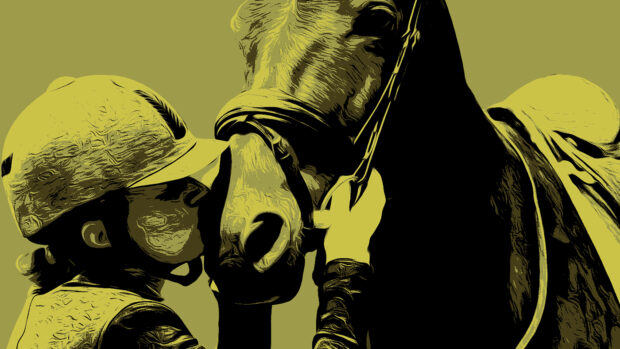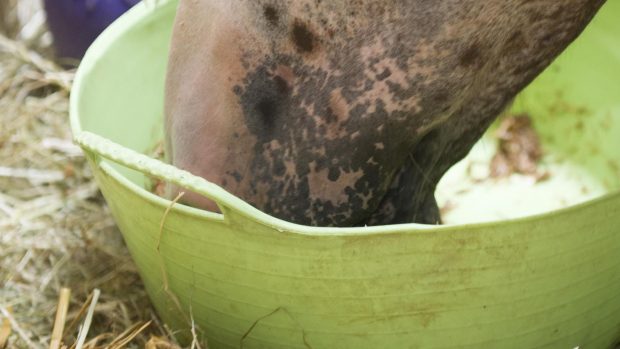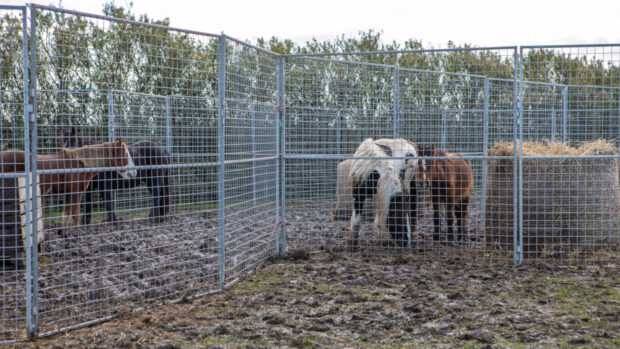The measures horse owners, sport leaders and vets can take to maximise our industry’s environmental sustainability have come into the spotlight.
FEI president Ingmar de Vos joined equine internal medicine specialist David Rendle on a discussion panel at the 2023 World Horse Welfare conference, with charity director Jenny Fernando and Agata Rzekec, of the French horse and equestrian institute.
The panel, chaired by Sky News sports editor Nick Powell, considered what “radical” ideas should be considered to enable horse sport to be more sustainable, what vets and owners can do about resistance to wormers and antibiotics, and how yards and owners can give their horses the best care and manage the land they graze to maximise sustainability. The discussion was in keeping with the theme of the day: “Horses and the environment: friend or foe”.
On the first topic, Mr de Vos said he did not like the word “radical”, as radical ideas and solutions “have not always been the most sustainable ones”. He added that the conference had heard great ideas, but the biggest challenge is in communicating them.
“The international sport world is very aware of its responsibility and how society is looking at them when it comes to environmental sustainability,” he said, adding that taking action regarding the 4,500-plus FEI events per year is key, and that he believes sustainability should contribute to the work on categorising events and organisers, perhaps with recognition of best practice. Ms Fernando cited Forest Green Rovers, the first carbon-neutral football club, showing that events can be green.
Ruth Dancer, director of environmental sustainability specialists White Griffin who had spoken at the conference, said many of the day’s suggestions are already being acted on.
“The industry is working at pace and has been all year,” she said. “In the next month, you’ll probably be hearing about Kitemarks, awards, toolkits. But don’t carbon-offset your way out of this problem. Carbon-offsetting is just a consumerism, we’ve got to reduce what we do and improve our work on the land. So I’d ask everyone on the panel, what one thing would you like to see happen in the equestrian space around environmental sustainability?”
Ms Rzekec would like people to ask event organisers to make an effort, as “I believe people are the main source of evolution,” and Ms Fernando would like “lots of small things”.
“More hedges, better grazing, more toolkits and more help for people,” she said.
Mr Rendle said he would like restriction in the sale of toxic medicines, which led into the next topic. He said the important thing is for everyone to be aware of the eco-toxic effects of “much of what we do”; most wormers are toxic and there are groups of people calling for their use to be banned.
“Do people think about the harmful effects of fly spray, what that does to other insects and their predators?” he asked, adding that ivermectin remains toxic in the environment for four months and that worming drugs enter our water systems, where they are harmful to aquatic life.
“This is a huge issue and awareness needs to be much higher,” he said. “We all have the responsibility to look carefully at how we use these drugs.”
Mr Rendle said this includes anti-bacterials, which can lead to populations of resistant bacteria that have a negative effect on wild and domestic species, and that many of these drugs would not have to be used if we managed horses better.
“I’m afraid voluntary actions will probably never be enough as it’s too easy to use these drugs,” he said. “So we will need some restriction if we’re serious about preventing the environmental damage of these drugs and that will have welfare benefits.”
On the final topic, Ms Rzekec said horse owners “present green assets”, and that correct management is key.
“I’m convinced the industry can find a balance and achieve sustainability,” she said. “We need to communicate our green assets more.”
But she said avoiding overstocking fields and poo-picking can help reduce emissions of nitrogen, and keeping permanent vegetation can help prevent harmful run-off. This can also promote biodiversity.
“Grasslands are important in carbon storage, which is the main green asset of equestrians,” she said.
Ms Fernando said when World Horse Welfare started looking at its sustainability, they were not experts but had to learn, and that learning from each other is key. She said knowledge of each piece of land leads to its correct management.
“Not all of us have acres of land to manage; I don’t but I can still make sure I worm responsibly, recycle feed packaging and don’t leave buckets overflowing,” she said.
“It depends on what you can afford and what your horses need. What simple things can I do that work for me and my horses. Look at one or two simple projects that will work for you and go from there.”
You might also be interested in:

How being greener could protect our horses, land and sport

Powered by poo: horse manure heats and lights four-day World Cup show
‘It’s possible to charge a phone with only 0.2 decilitres of horse manure’

Subscribe to Horse & Hound magazine today – and enjoy unlimited website access all year round
Horse & Hound magazine, out every Thursday, is packed with all the latest news and reports, as well as interviews, specials, nostalgia, vet and training advice. Find how you can enjoy the magazine delivered to your door every week, plus options to upgrade your subscription to access our online service that brings you breaking news and reports as well as other benefits.





